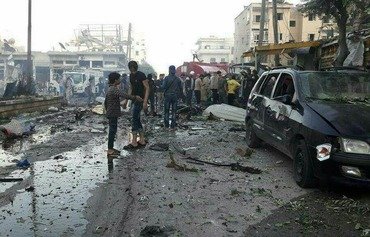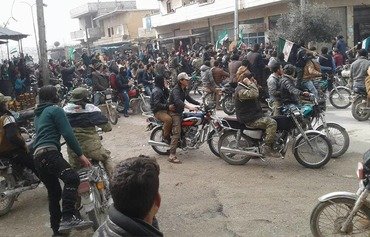Tahrir al-Sham -- an extremist alliance dominated by the former al-Nusra Front (ANF) -- has been imposing its al-Qaeda derived ideology on Idlib residents since forcing rival Ahrar al-Sham out of the city, Syrian activists told Diyaruna.
"Tahrir al-Sham recently annihilated more than 20 Free Syrian Army (FSA) factions for their refusal to pledge allegiance," Idlib media activist Musab Assaf told Diyaruna, using a pseudonym because of the security situation.
Immediately after taking control of the city, Tahrir al-Sham banned the establishment of any new military faction that is not part of its alliance, and ordered defectors from all groups, including its own, to turn in their weapons.
The alliance plans to impose its al-Qaeda-inspired ideology throughout Idlib province by eliminating Ahrar al-Sham, which does not share its views, he said.
"Tahrir al-Sham has always insisted on disseminating an extremist ideology based on the ideas of al-Qaeda," Assaf said, noting that this contrasts with Ahrar al-Sham's call for governance through civil councils.
Fighting between the two sides erupted after Tahrir al-Sham made several attempts to subsume Ahrar al-Sham, but those attempts failed, he said.
Idlib residents are fearful of the unknown fate that awaits them now that their city has been turned into a "major headquarters of Tahrir al-Sham, al-Qaeda’s branch in Syria", Assaf said.
"This gathering is one of the largest gatherings of terrorist groups in the world and includes Arab and foreign elements who came to Syria for 'jihad'," he said, stressing that "local residents reject Tahrir al-Sham's presence".
Raids and mass detentions
"The first thing Tahrir al-Sham did after taking control of the city of Idlib and surrounding villages and towns was raid dozens of homes and arrest residents and media activists who oppose the group," said activist and media professional Sumer Agha of the Salamiyah co-ordination committee.
Tahrir al-Sham subsequently released a large number of them after obtaining written pledges that they would not attack or criticise the group for any reason, he said, noting that many remain in detention.
As for Ahrar al-Sham elements, he said, none remain in the region -- not even natives of the city and its surrounding area -- and many of them also moved their families to new positions taken by Ahrar al-Sham outside the area.
Tahrir al-Sham has banned imams who were affiliated with or supported Ahrar al-Sham from giving religious lessons or delivering Friday sermons at local mosques, he added.
Imposing its control over the city's religious life is not the alliance's only goal.
"Among the reasons Tahrir al-Sham rushed to capture the region is to control the Bab al-Hawa border crossing," Agha said.
Bab al-Hawa is a key supply route between Syria and Turkey, he said, pointing out that the alliance's financial resources are depleted and it is seeking to secure its revenue streams by ensuring its access to the crossing and other trade routes.
'Extremism, injustice, oppression'
"Living under the rule of Tahrir al-Sham is not much different from living under the rule of the 'Islamic State of Iraq and Syria' (ISIS)," said Idlib city shop owner Abdul-Aziz Barakat.
It is the same situation, with the same "extremism, injustice, oppression and suppression of personal freedoms", he told Al-Mashareq.
When Tahrir al-Sham took control of Idlib city and its surrounding areas, "the flags of the Syrian revolution disappeared immediately", he said.
The alliance's fighters took the flag down as soon as the city was under their control, he said, threatening to punish whomever dared to raise it.
They also seized the sharia courts, and began conducting intensive patrols in the city’s streets and ordering internet cafés to keep records of all customers.
"These patrols also have begun to harass women and girls in the streets and markets and criticise them for wearing only a headscarf, inferring that they are required to wear a full niqab instead," he said.
Others have been rebuked for leaving their houses without a male family member, Barakat added.
"Most relief organisations have suspended their operations in the city of Idlib and its rural areas in the wake of the recent events," he said.
This will only increase the suffering of civilians, many of whom live below the poverty line and are in dire need of aid.
Through its media activists, the alliance is trying to deny this and to claim that the work of humanitarian organisations has not stopped, he said, by publishing forged statements and images of old cash aid vouchers with no balance left.

![The flags of extremist alliance Tahrir al-Sham and al-Nusra Front are raised during a demonstration held by Tahrir al-Sham elements and supporters in Idlib earlier this year. [Photo courtesy of Musab Assaf]](/cnmi_di/images/2017/08/04/9048-Syria-Idlib-terror-600_384.jpg)






